| |||||
| Decades: | |||||
|---|---|---|---|---|---|
| See also: | |||||
1962 crisis in Nigeria
| |||||
| Decades: | |||||
|---|---|---|---|---|---|
| See also: | |||||
1962 crisis in Nigeria

Nnamdi Benjamin Azikiwe, commonly referred to as Zik of Africa, was a Nigerian politician, statesman, and revolutionary leader who served as the 3rd and first black governor-general of Nigeria from 1960 to 1963 and the first president of Nigeria during the First Nigerian Republic (1963–1966). He is widely regarded as the father of Nigerian nationalism as well as one of the major driving forces behind the country's independence in 1960.
Chief Emeka Anyaoku, GCON, GCVO, CFR, CON is a Nigerian diplomat of Igbo descent. He was the third Commonwealth Secretary-General. Born in Obosi, Anyaoku was educated at Merchants of Light School, Oba, and attended the University College of Ibadan, then a college of the University of London, from which he obtained an honours degree in Classics as a College Scholar. Aside from his international career, Chief Anyaoku continues to fulfill the duties of his office as Ichie Adazie of Obosi, a traditional Ndichie chieftainship.

Chief Obafemi Jeremiah Oyeniyi Awolowo was a Nigerian nationalist and politician who played a key role in Nigeria's independence movement (1957–1960). Awolowo founded the Yoruba nationalist group Egbe Omo Oduduwa, and was the first Leader of Government Business and Minister of Local Government and Finance, and first Premier of the Western Region under Nigeria's parliamentary system, from 1952 to 1959. He was the official opposition leader in the federal parliament to the Balewa government from 1959–1963.
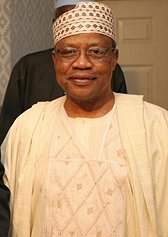
Ibrahim Badamasi Babangida is a Nigerian statesman and military dictator who ruled as military president of Nigeria from 1985 when he orchestrated a coup d'état against his military and political arch-rival Muhammadu Buhari, until his resignation in 1993 as a result of the post-12 June 1993 election which he illegally nullified.

The Nigerian Civil War, also known as the Biafran War, was a civil war fought between Nigeria and the Republic of Biafra, a secessionist state which had declared its independence from Nigeria in 1967. Nigeria was led by General Yakubu Gowon, and Biafra by Lieutenant Colonel Chukwuemeka "Emeka" Odumegwu Ojukwu. The conflict resulted from political, ethnic, cultural and religious tensions which preceded the United Kingdom's formal decolonisation of Nigeria from 1960 to 1963. Immediate causes of the war in 1966 included a military coup, a counter-coup, and anti-Igbo pogroms in the Northern Region. The pogroms and the exodus of surviving Igbos from the Northern Region to the Igbo homelands in the Eastern Region led the leadership of the Eastern Region to conclude that the Nigerian federal government would not protect them and that they must protect themselves in an independent Biafra.

The chief justice is the Republic of Fiji's highest judicial officer. The office and its responsibilities are set out in Chapter 5 of the 2013 Constitution of Fiji. The chief justice is appointed by the president on the advice of the prime minister.
Chief Samuel Ládòkè Akíntọ́lá otherwise known as S.L.A. was a Nigerian politician, aristocrat, orator, and lawyer. He served as Oloye Aare Ona Kakanfo XIII of Yorubaland and served as premier of Western Nigeria from independence in 1960 till his assassination in 1966.
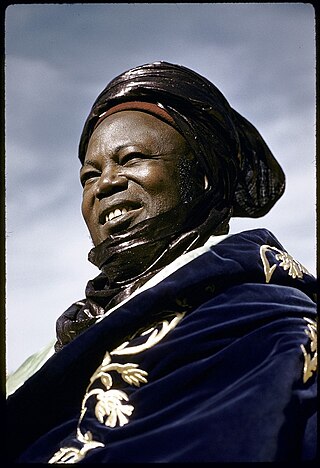
Sir Ahmadu Bello, famously known as Sardauna of Sokoto, was a conservative Nigerian statesman who was one of the leading northern politicians in 1960 and served as its first and only premier from 1954 until his assassination in 1966, in which capacity he dominated national affairs for over a decade.
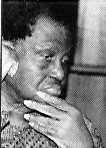
Chief Frederick Rotimi Alade Williams, QC, SAN was a prominent Nigerian lawyer who was the first Nigerian to become a Senior Advocate of Nigeria. In the 1950s, he was a member of the Action Group and subsequently became the minister for local government and justice. He was the president of the Nigerian Bar Association in 1959. He left politics in the 1960s, as a result of the political crisis in the Western Region of Nigeria.
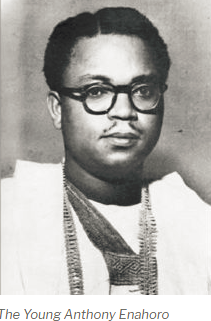
Chief Anthony Eromosele Enahoro was one of Nigeria's foremost anti-colonial and pro-democracy activists.

David Akpode Ejoor RCDS, PSC, was a Nigerian military officer who served as Chief of Army Staff (COAS).

The Berlin Crisis of 1961 was the last major European political and military incident of the Cold War concerning the status of the German capital city, Berlin, and of post–World War II Germany. The crisis culminated in the city's de facto partition with the East German erection of the Berlin Wall.
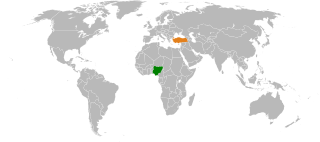
Diplomatic relations at the legation level were established in 1960 and then to the rank of ambassador in 1958. Turkey opened an embassy in Lagos, then capital of Nigeria in 1962. Turkish embassy moved to Abuja in 2001 after Nigeria's proclamation of Abuja as the new capital. Nigeria has an embassy in Ankara.

Robert Adeyinka Adebayo was a Nigerian Army major general who served as governor of the now defunct Western State of Nigeria, 1966–1971. He was also Chief of Staff of the Nigerian Army and was Commandant of the Nigerian Defence Academy.
Chief Akintunde Aduwo is a retired Nigerian Navy Vice Admiral who served as Chief of Naval Staff from 1980 to 1983 and as military governor of the Nigerian Western State from July 1975 to August 1975 during the military regime of General Murtala Muhammed.
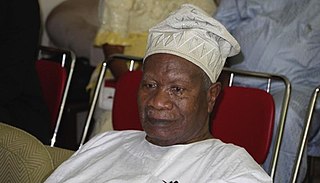
Chief Moses Adekoyejo Majekodunmi was a Nigerian gynaecologist and obstetrician. He was Minister of Health in the Nigerian First Republic.
Operation Wet ẹ was a violent protest that took place in Western Nigeria between violent political factions, the Hausa-Fulani natives and some members of the Nigerian National Democratic Party during the First Republic. Although it began in 1962, it essentially set in motion a chain of events that eventually led to the first military coup in Nigeria on 15 January 1966.
Chief George Baptist Ayodola Coker was a Justice of the Nigerian Supreme Court, serving from 1964 until 1975. He was an author of two books:Family Property among the Yorubas, and a lecture series, Freedom and Justice.
Garo, a common Armenian first name, shortened version of Karapet / Garabed. For Eastern Armenian variant of Garo, namely Karo, refer to Karo (name)